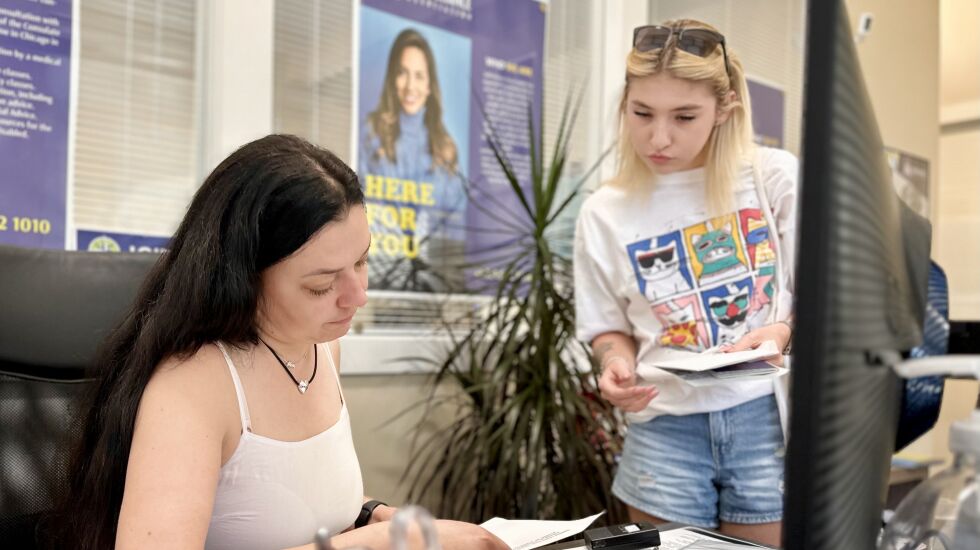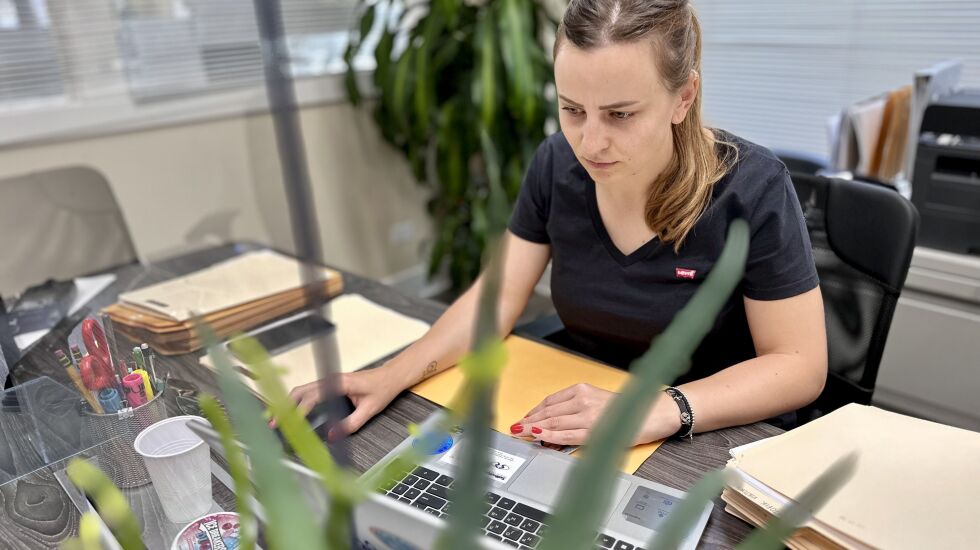
On a recent morning in Chicago’s Ukrainian Village, the Selfreliance Association office buzzed with phone calls and bustled with foot traffic. Some Ukrainian immigrants called in to get help applying for work authorization permits. Others came in person to get documents translated.
For Darina Semenets, the group provided much-needed help when she arrived in Chicago as a refugee eight months ago.
“Many people don’t know English, and it’s [a] big problem,” said Semenets, one of thousands of refugees who fled Ukraine following Russia’s invasion in February 2022.
The 27-year-old found a home in Ukrainian Village and now a job with the same organization that helped her.
“I started working for Selfreliance Association and help the Ukrainian people … applying for Social Security, work permit, medical insurance and other programs,” she said. The nonprofit also offers English as a Second Language classes four times a week.
For many immigrant communities all over Illinois, language is a barrier to accessing and engaging with their new government. They face challenges getting basic services, much less participating in civic life. Advocacy groups say more resources and attention to language access — both in terms of government services and voter outreach — are needed if immigrants are to participate fully in the economic, social and civic life of Illinois.
The state has more than 1 million residents — close to 8% of the population — who speak English “less than very well,” according to the U.S. Census Bureau. Their native tongues include Spanish, Chinese, Polish, Tagalog, Arabic and Hindi and dozens of other languages.

In Chicago, about one-third of individuals 5 years and older speak a language other than English at home, according to data from the U.S. Census Bureau’s 2021 American Community Survey. And there are more than 40 languages or groups of languages spoken in homes across the city, according to a WBEZ analysis.
Dozens of organizations such as the Selfreliance Association have partnered with the city and state to help limited English speakers access health care, food stamps and other services.
Breandán Magee oversees these partnerships for the Illinois Coalition for Immigrant and Refugee Rights. He said community-based organizations “provide that link: They interpret, they translate, they also advocate for their clients directly in the local state benefit offices.”
Officials at the Illinois Department of Human Services say it provides language access services through a state welcoming center and other resource centers. But advocates say that’s not enough.
Magee said government agencies rely on community organizations to do the heavy lifting with language access — not just being direct service providers but providing feedback and looking over translated materials. The government often pays these groups, he said.
“These are not-for-profits that are receiving money, and they’re working on shoestrings,” he said. “It’s not a very lucrative industry by any stretch of the imagination. More funds are needed.”
Magee said investing in language access will not only give immigrants what they need in the short term, but will help them engage in civic life.
“That’s important for them getting on the road to self sufficiency, which essentially brings you into a much closer level of civic engagement, which leads to voting and all of the empowerment that comes with that,” Magee said.
Plus, language is a major barrier to citizenship. Many eligible residents don’t take steps to naturalize because they lack the confidence to take the citizenship test in English. The Illinois Coalition for Immigrant and Refugee Rights recognizes that and provides civics curricula in various languages and to help people prepare for the test.
As community organizations try to fill the gaps left by government agencies, advocates bluntly warn against using less-than-ideal technology, such as Google Translate, to interpret websites and materials.
“They make no sense and do more of a disservice,” said Shobhana Johri Verma, executive director of the South Asian American Policy & Research Institute.
Last year the institute was part of a coalition that advocated for more language help at the polls. They pushed the Chicago Board of Election Commissioners to update important voter information on its website in key Asian languages and to add more bilingual workers and materials on Election Day.
The law is clear that assistance must be given. Section 203 of the federal Voting Rights Act mandates that a state or municipality provide language help to voters if more than 5% of voting-age citizens are members of a single-language minority group.
Verma said government agencies — from those in charge of elections to public benefits to drivers licenses — need more staff that represent the communities they serve.
“We need to look at the diversity in the workforce when we’re staffing,” she said. “Do we have employees with bilingual skills that are community-facing and not just pulling employees from different departments just because we got a call in a particular language?”
Responding to advocacy groups’ calls for more language services for immigrant voters, Chicago Board of Election Commissioners spokesman Max Bever said his agency has added more bilingual staff and directed most of its advertising dollars toward immigrant communities. The board is also working to revamp its website.
He acknowledged that “democracy doesn’t stop and start at the ballot box, and … there’s many steps to take before you can even get to that ballot box.”
Esther Yoon-Ji Kang is a reporter on WBEZ’s Race, Class and Communities desk. Follow her on Twitter @estheryjkang.
This story is part of “The Democracy Solutions Project.” It’s a collaborative effort among WBEZ, The Chicago Sun-Times and the University of Chicago’s Center for Effective Government. Together, we’re examining critical issues facing our democracy in the run-up to the 2024 elections.







